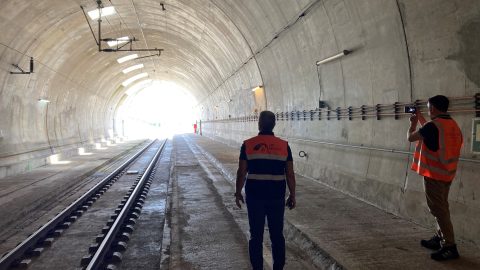Swiss & Austrian ‘smart train’ tests semi-autonomous braking

Rail Cargo Group (RCG) and SBB Cargo, the national rail freight carriers of Austria and Switzerland, are pooling resources to develop their own ‘intelligent freight train’. It will feature a semi-autonomous braking system as part of an advanced telematics and cloud-based information platform.
The alliance, which is also utilising the technical expertise of Austrian-based railway engineering test specialists PJ Messtechnik (PJM), has signed a contract for a partially-automated train preparation system, the first step of which is the integration of the automatic brake test. The aim is to lay the foundations for a ‘new standard’ in in-train communications.
Sensor technology
RCG says the digitalisation of rail freight traffic is gathering pace, and customer requirements regarding telematics and sensor technology are continually increasing. This means it is even more important, they say, to standardise, digitalise and eventually to automate current production processes in rail freight traffic.
Currently, brake tests have to be carried out manually, which means that for each new train, an employee must check the brakes are functioning on every wagon before departure. The future goal is for this to be performed automatically, providing increased reliability and safety, particularly with regard to employees’ activities in shunting operations and when preparing trains.
Test train
The joint and supranational development of products in rail freight traffic makes sense in many respects. For example, the system solutions developed can be tested across national borders – in this case, in Switzerland and Austria. This accelerates the acquisition of official recognition across Europe. For this reason, SBB Cargo, the RCG and PJM are together developing a marketable test train.
This pilot project represents a milestone in the technological development of rail freight traffic, offering not only guaranteed interoperability, but also open and proven standards for European goods traffic. PJM, an accredited test body for railway vehicles, will provide the necessary test technology with the WaggonTracker System. It also develops and manufactures products in the field of measurement technology, telematics and monitoring solutions for the railway sector. Initial tests take place this summer, with the hope that the first generation of the partnership’s intelligent freight train will be in production on the Swiss and/or and Austria network by 2018.
You just read one of our premium articles free of charge
Want full access? Take advantage of our exclusive offer






